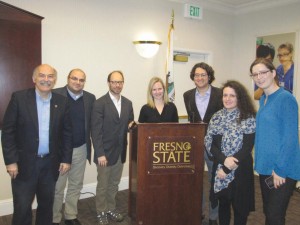
Photo: Michael Rettig
Michael Rettig
Editor
The Ottoman Empire of the 20th century was a complex region; home to a variety of ethnic and religious groups. However, the multifaceted demography of the Empire did not warrant the terminology imposed upon it by European powers. On Friday, February 3, Dr. Laura Robson (Portland State University) delivered a timely presentation on “War, Peace, and the Making of Minorities in the Post-Ottoman Middle East, 1919-1923,” in which she challenged the audience to think more carefully about the term “minority” in defining the people cohabiting the Ottoman Empire.
The lecture followed a workshop on “Ethnic and Religious Minorities in the Ottoman Empire,” held earlier in the day, which was organized by Dr. Stacy Fahrenthold (History Department) and Dr. Sergio La Porta (Armenian Studies Program).
Both events were sponsored by the Armenian Studies Program, the Leon S. Peters Foundation, the College of Social Sciences, the Islamic Studies Lecture Series, and the History Department.
According to Robson, the term “minority” is problematic in referring to Ottoman subjects because it did not accurately describe the relationship the government had with its diverse populations. “We don’t have minorities in the late Ottoman Empire. We have identifiable communities with different sets of relations with the central authorities that are becoming more problematic and violent by World War I,” explained Robson. “Minority” was an invented term imposed on the Middle East in order to change the political landscape.
The concept of minorities originated in Europe at the collapse of the Habsburg Empire, as European powers were determining which post-Habsburg nationalities would achieve their own state, and what to do with those who did not. The concept of minorities was formalized at the Treaty of Versailles, in which European powers identified minorities as groups who possessed collective rights that could only be protected by a power outside of the state in which they lived. States were thus monolithic entities where minorities did not comfortably fit. According to Dr. Robson, this allowed the imperial European powers to intervene in the Middle East through the League of Nations on the grounds of protecting these minorities. However, Dr. Robson noted that the “minority” label only hurt those who it was supposedly meant to help.
Robson demonstrated the harm that the process of minoritization inflicted on post-Ottoman subjects by examining the relationship between the British and Assyrians in Iraq. Assyrians arrived as refugees in Iraq in 1918. The British marched these refugees into Baqubah, where approximately one third died along the way.
When the Iraqi people revolted against British rule after World War I, the British set up a client monarchy under Faisal I. However, the British felt the need to maintain an army in the region to combat anti-colonial Arabs and Kurds. They recruited an army of reluctant Assyrian refugees to police the region, thus straining relations between the Assyrians and their Kurdish and Arabic neighbors.
In 1924, control of Northern Iraq was still contested by both Turkey and British-backed Iraq. The British succeeded in sending the matter to the League of Nations, which would determine which nation had a stronger claim to the region. According to Robson, the British used the minority status of the Assyrian community to argue for British control over Northern Iraq.
“They started explicitly and repeatedly referring to the Assyrians as a minority who required external protections that only Britain could provide,” explained Robson. By the early 1930s, the Iraqi government became increasingly hostile towards the Assyrian refugees, who they viewed as “colonial stooges.” When the British abandoned the region, the Iraqi army massacred thousands of Assyrians.
Robson concluded by stressing that the origins of many of the problems facing the contemporary Middle East arose out of this process of minoritization. “The populations themselves are longstanding, but their organization into oppositional minorities and majorities was a result of European intervention and the violence of World War I.”
 Hye Sharzhoom Armenian Action
Hye Sharzhoom Armenian Action